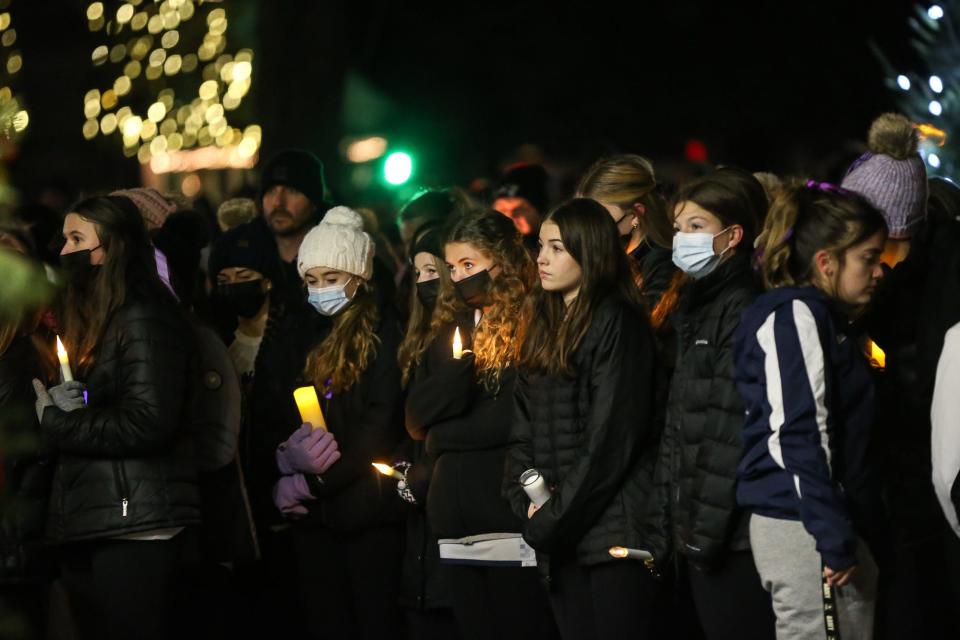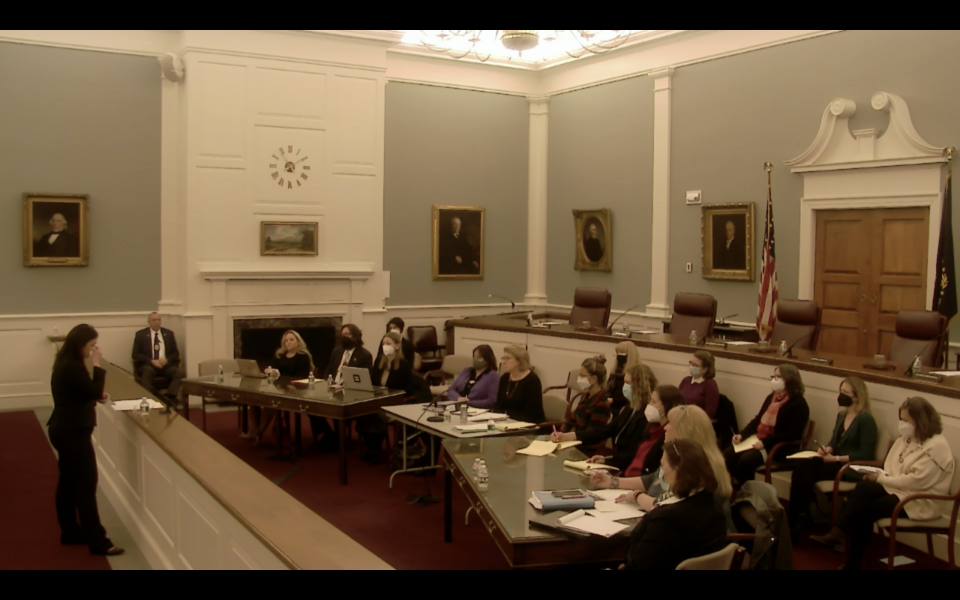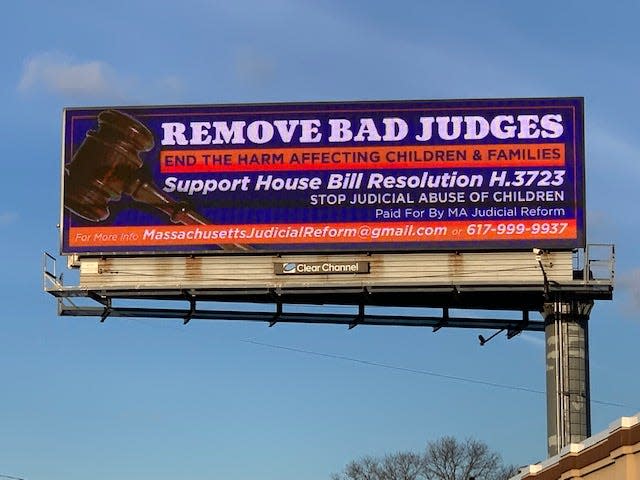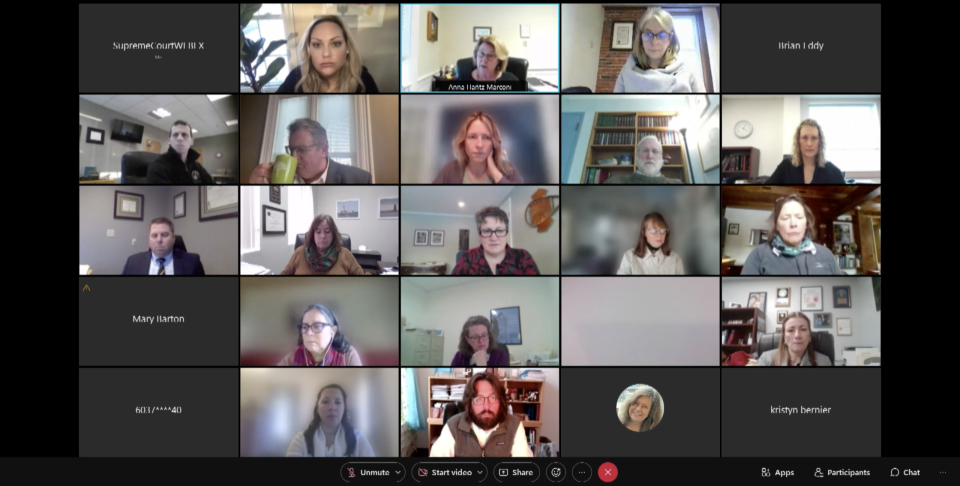If judges issue bad rulings and people die, should the courts pass the disciplinary gavel?
On Oct. 20, New Hampshire circuit court Judge Polly Hall denied a 33-year-old Hampton woman a permanent restraining order against her ex-boyfriend, Richard Lorman, saying the evidence presented did not meet the state’s legal threshold of abuse.
Three weeks later, Lorman, 55, pulled up to his ex’s place of work in Salem, Massachusetts. He shot her in the head in public then killed himself in an attempted murder-suicide. She survived.
Despite the bloodshed left in the wake of the decision, a panel of judges found Hall's denial "reasonable."
Advocates felt otherwise, and outcry about the case prompted the Granite State to begin reevaluating its narrow definition of domestic violence, the training provided to judges and the resources available to people reporting abuse.
More from New Hampshire: Hampton woman shot in attempted murder-suicide had warned 'he will resort to violence'
Seemingly overlooked as needing attention, advocates argue, is the large role the court system has in policing itself, and how seldom judicial accountability happens in the public eye nationwide.

There's “no real system in place to hold them accountable,” said Erica Austin, a survivor-turned-advocate who works in Massachusetts and New Hampshire crisis centers.
Judges judging judges: Courts' response raises questions
Domestic violence cases typically make headlines when someone dies or when attacks occur in public, such as in the Salem attempted murder-suicide and in the Dec. 17 murder of Shirley Owen, 49, in Franklin, Massachusetts.
Owen’s suspected killer, her ex-husband, Brendon Owen, 47, allegedly had a history of restraining order violations. In the Dec. 17 attack, he beat her and then set the house on fire, police and prosecutors have said.
'Incredibly egregious': Ex-husband charged with Shirley Owen's death, burning Franklin home
Headlines like those happen more often than judicial misconduct complaints result in public discipline.
Every state has its own oversight body to investigate complaints and issue disciplinary recommendations. In all six New England states, judges, governors, legislators and the state bar oversee the appointments, and each state's commission must include members of the public, according to the national nonprofit Center for Judicial Ethics.

Representatives from the New England commissions have defended the integrity and objectivity of their processes while speaking with the USA TODAY Network.
Legal experts and advocates in multiple states countered with concerns about how much of the power is wielded by judges (who are political appointees throughout the New England states), attorneys and politicians who run in the same legal circles as the people they’re investigating.
Related: When confidentially ceases in formal judicial discipline proceedings
Indiana University law professor Charles Gardner Geyh shared similar concerns with NBC News as part of a judicial misconduct investigation the news outlet published in December.
"We have to recognize that oftentimes we have judges judging judges, and they’re ultimately in control and judging their own," he reportedly told NBC News.
NBC News' investigation found many states privately reprimand judges more than they do publicly. Out of thousands of judicial misconduct complaints filed with oversight commissions across the country between 2016 and 2020, roughly 1 percent resulted in public discipline or judge resignations, according to the investigation.
'It's not objective'
Data like that is why Lyn Schollett, the executive director of the New Hampshire Coalition Against Domestic and Sexual Violence, said she wasn't surprised the state Supreme Court tapped an internal panel to review Hall's decision to deny the protective order against Lorman.
The panel included one member of the state's judicial conduct committee who has federal experience and served as president of the state bar, three judicial branch colleagues of Hall's, the administrator of the circuit courts, and a staff attorney who provides "advice and support" to circuit court judges, according to the group's final report.
“It’s not objective and it wasn’t done from an outside perspective,” said Schollett. "It was a hard report for advocates to read."
New Hampshire's court system did create a task force to explore ways it could better handle domestic violence cases, but the task force's charges and focus were based on the findings of the panel's Nov. 23 report, Schollett said.
Related in accountability:
Maine keeps ruling police shootings as justified. Experts point to one needed reform.
Maine leaders 'open' to reforming police shooting investigations but offer no commitments
Austin, the survivor-turned-advocate, said this and other cases she's encountered in area crisis centers should shine a spotlight on the judicial system. The courts will continue to fail victims of abuse, Austin testified before the state’s task force during a Jan. 21 public hearing, if they overlook the need for more accountability and transparency.
“There are few jobs in this country where you are appointed to a lifelong position with enormous power over the direct safety of others. Literally, life or death decisions,” said Austin, founder of StrongHer, a fitness program for survivors of domestic violence. “The state of New Hampshire and the judiciary have an obligation to ensure that these enormously powerful positions are not abused, and that there is oversight and accountability to those who are fortunate enough to be appointed.”

Austin also testified about her own case, a child custody battle that involved abuse. She told the task force the trauma the judge caused her and her son "will last a lifetime."
"My experience with this New Hampshire judge — and the individuals he manipulated and threatened within the system for his own benefit — has profoundly traumatized me and forever changed how I view the world," she testified. "He stripped me of my ability to protect my child and left me with a nearly constant fear that I won’t ever be able to protect my child. I do not feel safe in this state anymore. It left me believing that my voice doesn’t matter, and that it will never be heard."
Since highly sensitive court cases, like family court matters, often happen behind closed doors to protect privacy, plaintiffs and defendants are forced to risk retribution while shouldering the burden of fighting the “fox guarding the hen house," Walter Sorensen Jr., a Groveland, Massachusetts, father, told the USA TODAY Network.

The answer, Sorensen argued, is the public deserves a larger role in holding the courts accountable.
“You can’t believe stuff that’s happening until it actually happens to you,” said Sorensen, who is leading a legislative petition to remove from office an Essex County judge he alleges has been biased against him throughout a years-long child custody battle.
'It's not about specific cases'
A New Hampshire legislator has floated a constitutional amendment that would establish a petition process the public can use to recall state judges. The proposal, CACR 27, has received strong opposition from the state bar association, NH Business Review reported on Jan. 20.
“We see this as an effort that would politicize judicial decisions in court cases, and we think that is not proper,” New Hampshire Bar Association President Richard Guerriero reportedly told a House committee during a Jan. 13 hearing. “If judges are thinking about or pressured by efforts to remove them from office because of their actions in particular cases, that will politicize their position, which is not what our constitution intends.”
That concern is shared by Massachusetts lawyers, judges and legal experts who served on the Boston Bar Association’s Judicial Independence Working Group in 2019. The group, in an August 2019 report, wrote the justice system is weakened if there’s even a public perception that political pressures can sway decisions on the bench.
“It is, of course, perfectly fair to criticize judicial decisions and the judges who made them,” the working group wrote in its report. “And such criticism is not out of bounds simply because it may be caustic or unfair.”
But what of the perception that judicial misconduct allegations are robed in secrecy and that the states’ existing checks and balances could serve as a rubber stamp?
The Judicial Independence Working Group recommended in its 2019 report that Massachusetts “expand and improve its data collection and transparency practices.”

Similar calls have been made in the other New England states in recent years, including during New Hampshire’s Jan. 21 public hearing on its courts’ handling of domestic violence cases.
“Data must be collected on how judges are ruling in domestic violence cases and should be accessible to the public,” Austin, the advocate and survivor, said during the Jan. 21 public hearing. “I should be able to see how many times Judge Hall is denying protective orders versus her peers who sit in other courts.”
Related: Watchdog group aims to bring transparency to Mass. court system
New nonprofit court watchdog groups have popped up in recent years, including CourtWatch MA, but advocates and attorneys argue their limited staffing and funding shouldn't bear the onus of holding judges accountable.
Reactive vs. proactive court accountability
The states could potentially look to Arkansas for ways to strengthen their judicial conduct commissions.
Arkansas’s Judicial Discipline and Disability Commission has about one full-time employee for every 53 state judges, a 2020 investigation by Reuters found. Reuters found the national average is a ratio of 1-155.
Reuters also reported Arkansas publicly disciplines about 13 in every 100 judges it investigates, more than double the national average of 6 per 100 judges.
Focusing solely on enhancing enforcement might be too reactive to prevent issues like the Salem attempted murder-suicide from happening in the first place, though.
Misconduct around the nation: Michigan Supreme Court removes Judge Theresa Brennan from bench effective immediately
Schollett said she believes the courts could more proactively address issues if judges more regularly sat down with advocates, attorneys, court staff and experts in their courtrooms to discuss how domestic violence and other nuanced cases are being handled.
New Hampshire judges used to hold such sessions monthly, but Schollett said they stopped about eight years ago. She said this has made judges “so insulated from interactions and feedback from the public,” which could possibly undermine the state's efforts to strengthen judicial training around domestic violence.
“There needs to be a feedback loop,” she said. “It’s not about specific cases… It’s much more about how the courts are run and being able to provide feedback, and similarly if judges are having a problem with advocates in a case (they) can provide that feedback as well.”
NH domestic violence survivors: Judges need more training after Hampton woman was shot
New Hampshire’s justices have expressed support for increased accountability and transparency, however a court spokesperson declined the USA TODAY Network’s request to interview Chief Justice Gordon MacDonald about Schollett’s recommendation and other potential reforms.
The court spokesperson said in an email that such an interview “would be premature” at this time because the topics fall within the purview of the state task force's ongoing work.
This article originally appeared on USA TODAY NETWORK: Increasing judge accountability after Mass. attempted murder-suicide

